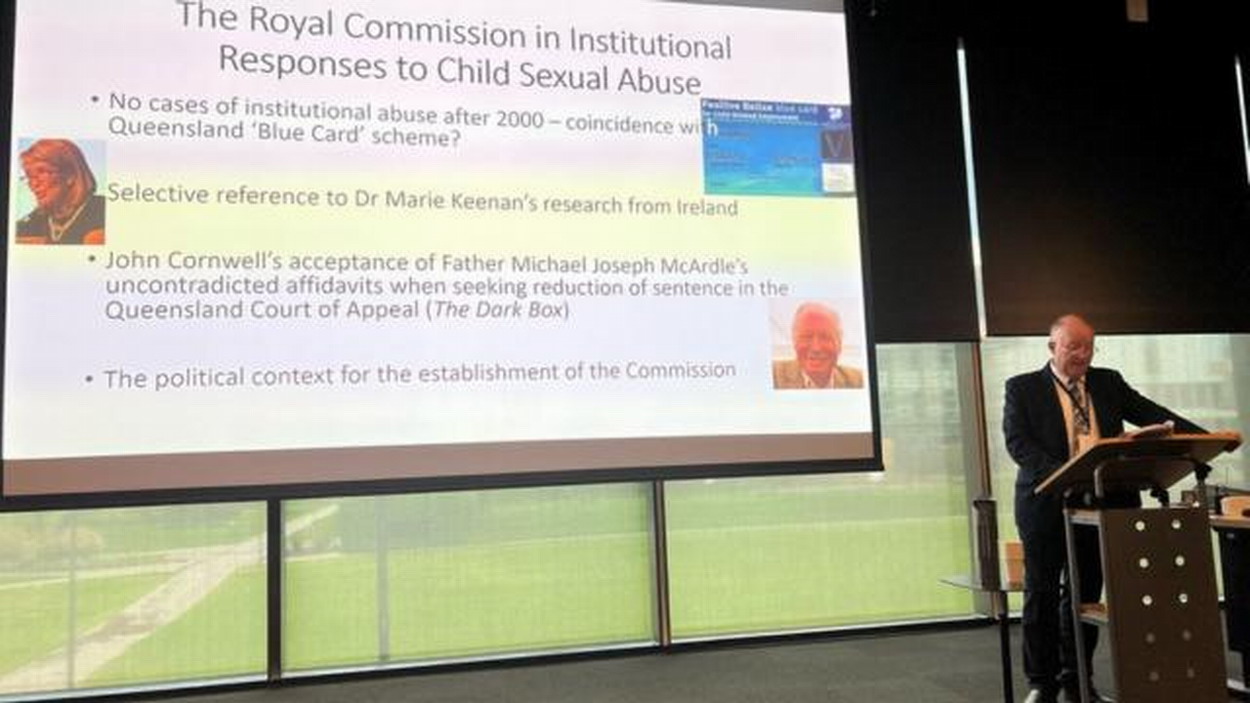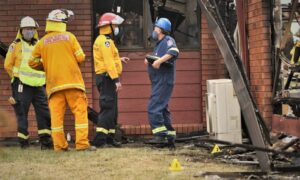Anti-cultists claim that the cases of child sexual abuse among the Jehovah’s Witnesses are higher than among Catholic priests. The claim is false.

On June 24, an anti-Jehovah’s-Witnesses organization called JZ Help is holding a web press conference on the theme “Jehovah’s Witnesses: Child Abuse Worse than in the Catholic Church?” From the presentation of the press conference, we learn that “Australian activist Lara Kaput and activist Steven Unthank from saysorry.org,” after having met with the German Reappraisal Commission in Berlin on June 20, will “share their experience” with the Australian Royal Commission. “At the press conference,” we read, “they [the anti-Jehovah’s-Witnesses activists] will present data from the Royal Commission’s investigation, which show that the number of victims within Jehovah’s Witnesses is many times higher than within the Catholic institutions studied. Based on the number of victims in Australia, an estimate of possible numbers of victims among Jehovah’s Witnesses in Germany, Austria, and Switzerland will be given.”
There are two problems with this. The first is that extrapolating data referring to one country to making estimates about another country is a notorious fallacy undergraduate students of sociology are warned against by their professors. If there are 500 Pakistanis in Florence (a theoretical example) and 50 of them ate chicken in a given day, we cannot infer from this than if there are 50.000 Pakistanis in Paris, 5.000 will eat chicken tomorrow. It is simply a non sequitur. The number of cases of child abuse among the Jehovah’s Witnesses in Australia, real or alleged, cannot be used to estimate the number of cases in Germany or anywhere else. Laws, the situation of families, local police practices, and a number of other relevant factors are different.
The second problem is even worse, because the press conference will present demonstrably false statistics. It will claim that according to the investigation by the Australian Royal Commission into Institutional Responses to Child Sexual Abuse “the number of victims within Jehovah’s Witnesses is many times higher than within the Catholic institutions studied.” This is not true.
Presumably, the activists will start from the oft-repeated claim in anti-Jehovah’s-Witnesses literature that the Royal Commission “discovered” records of “1,800 sexual abuse cases” among the Jehovah’s Witnesses in Australia (with 1,006 perpetrators). As American scholar Holly Folk explained, the Royal Commission figure “reflects the sum of all disciplinary reports and referrals, proven and unproven, that had been submitted to the Jehovah’s Witness organization in Australia over a 65-year period.” The Jehovah’s Witnesses themselves submitted these data to the Royal Commission, which did not “discover” anything by itself.
It is not very meaningful to compare the data submitted by Jehovah’s Witnesses and by the Roman Catholic Church to the Royal Commission. The Jehovah’s Witnesses submitted to the Royal Commission the number of all their internal reports about proven, unproven, and even improbable allegations of sexual abuse. As opposite to this, the Roman Catholic Church informed the Royal Commission of the number of claims filed against it by Catholics claiming they had been abused. Also, the Catholic Church submitted these data for a 35-year period, 1980 to 2015, while the Jehovah’s Witnesses reported allegations covering a period of 65 years. At any rate, even if one would consider that all the allegations of sexual abuse by the Jehovah’s Witnesses were “sexual abuse cases” (which, as explained earlier, would be incorrect), that “the number of victims within Jehovah’s Witnesses is many times higher than within the Catholic institutions” in Australia would still be false.
Note that the organizers of the press conference mention “the number of victims,” not the percentage of victims in comparison to the active members respectively of the Jehovah’s Witnesses and the Roman Catholic Church. Comparing percentages would be impossible because different incidents were reported, and with respect to different time periods. As for the absolute “number of victims,” the Royal Commission mentioned 4,444 claims against the Roman Catholic Church for 35 years and 1,800 allegations reported by the Jehovah’s Witnesses for 65 years.
It must be stressed that the latter were “allegations” of abuse, some of which did not even relate to members of the Jehovah’s Witnesses organization. The vast majority of these allegations referred to incest and other instances of abuse in the family, rather than in any religious institutional setting. Some of these allegations were very likely false accusations raised in custody disputes. “The accusation that there was a cover-up is also not true,” Folk wrote. “Of the 1,006 case files that the Jehovah’s Witnesses provided to the Royal Commission, 383 had been reported to the police at the time they had happened, and 161 had resulted in convictions. The notion that the Jehovah’s Witnesses had hidden information, or had not cooperated with law enforcement, or that these cases had not been brought to justice when they were reviewed and regarded as believable, is simply not true.”
There has also been a broader criticism of the Australian report and how it dealt with the Jehovah’s Witnesses. In a panel discussion of April 13, 2023, at the 2023 Australian National University annual conference on religion in Canberra, one of whose participants was the undersigned, Professor Keith Thompson, one of Australia’s leading authorities on the relationships between law and religion, stated that in investigating the Jehovah’s Witnesses the Royal Commission exceeded its mandate, which referred to abuses in institutional settings. These may have included church activities for children, Sunday Schools, or youth camps, and similar. These activities do not exist among the Jehovah’s Witnesses, and the Royal Commission proceeded to investigate and compile statistics on cases of sexual abuse that occurred (or might have occurred) in the family homes of Jehovah’s Witnesses: but these were not cases of “institutional” abuse and were outside the mandate of the commission.
Parenthetically, in his introductory speech for the Canberra panel, Professor Thompson observed that, “In my survey of the Royal Commission’s data, I can find no case of institutional child abuse in Australia that postdates the year 2000. All of the Royal Commission’s cases were historic cases, and many of those cases were disclosed by the institutions themselves.” He commented that both a broader awareness of the tragic phenomenon of child abuse in Australian society (and laws) and the measures introduced by the religious organizations themselves made institutional abuse a rare phenomenon in the 21st century.
In dealing with the Royal Australian Commission findings, anti-Jehovah’s-Witnesses activists often fall into a fallacy that is common in the international anti-cult rhetoric. It ignores the diachronic perspective that is essential in quantitative research. We are told that a certain number of cases of unreported (non-institutional) sexual abuse of minors might have occurred among the Australian Jehovah’s Witnesses, and are hit with seemingly impressive statistics. But it matters whether these cases, or the majority of them, occurred within the last few years as opposite to thirty or fifty years ago, when the general awareness of sexual abuse of minors was different not only among the Jehovah’s Witnesses but in the Australian society in general.
What happened after the Royal Commission report is also relevant. In an expert report dated February 2021, Professor Patrick Parkinson, an authority on child sexual abuse, concluded that the measures protecting children adopted in 2017 (but with significant earlier precedents) by the Jehovah’s Witnesses are adequate and compare favorably with other religions. Australian institutions have acknowledged that the Parkinson report is correct. Australia’s Charities and Not-for-Profits Commission (ACNC) has confirmed that the child protection policy of the Jehovah’s Witnesses meets the standards of Australian legislation.
On April 14, 2021, the ACNC informed the Watchtower Bible and Tract Society of Australia, mentioning the Parkinson report, that it would not revoke its charity status, as some had suggested it should do based on allegations of inadequate child protection. On May 6, 2021, the ACNC granted charity registration to a new congregation of the Jehovah’s Witnesses. It noted that “this registration has been completed as the result of due consideration of publicly available guidelines outlining the Jehovah’s Witnesses approach to child protection and safeguarding.”
The press conference announcement also claims that the alleged prevalence of sexual abuse among the Jehovah’s Witnesses “has to do with… the two witness rule.” Falling into another common anti-cult fallacy, this statement confuses the two different spheres of ecclesiastical and secular justice. Let’s assume that a Jehovah’s Witness is suspected of sexual abuse. Very rarely, for the reasons mentioned above, this would be a case of “institutional” abuse. In most cases, the abuse would occur in the family. The elders of the congregation are informed, or hear rumors about the abuse. When this happens, two different chains of events are set in motion. The first relates to informing the secular authorities. To some extent, this is regulated by national laws, which were somewhat under-developed decades ago but are becoming much stricter and more precise as social concern about abuse grows. The second chain of events will lead to an evaluation of whether and how the alleged offender should be prosecuted by the internal ecclesiastical jurisdiction of the Jehovah’s Witnesses, and eventually, if found guilty, disfellowshipped. It is of crucial importance that these two spheres are carefully distinguished.
It is factually false that the Jehovah’s Witnesses do not inform secular authorities of believable reports of sexual abuse their elders have received, or worse, vengefully disfellowship victim of sexual abuse, or those who report incidents of sexual abuse to secular authorities. All manuals of instructions for Jehovah’s Witnesses elders clearly mandate that the laws of the land should be obeyed when they require that cases of sexual abuse should be reported to the secular authorities. In fact, even if there is no legal duty to report, congregation elders are instructed to report the matter if a minor is still in danger of abuse.
The Biblical “two-witnesses rule,” requiring the testimony of two witnesses before a member can be sanctioned by an ecclesiastical judicial committee, does not refer to the relationships between the Jehovah’s Witnesses and secular jurisdictions but to how their internal ecclesiastical courts function. In an article published in 2019, “The Watchtower” clarified: “Does this [the two-witnesses rule] mean that before an allegation of abuse can be reported to the authorities, two witnesses are required? No. This requirement does not apply to whether elders or others report allegations of a crime.”
The two-witness rule (which of course does not mean that two persons should have “witnessed” the abuse, only that there should be two witnesses about the general circumstances of the case and the personalities of the accusers and the accused) has nothing to do with the decision whether a crime should be reported to secular authorities. It is a procedural rule of the internal ecclesiastical jurisdiction of the Jehovah’s Witnesses, a jurisdiction secular authorities cannot interfere with without violating the most basic principles of religious liberty.
Violating religious liberty of the Jehovah’s Witnesses seems to be what the press conference is all about. False allegations and slander are part of hate speech. More than in any other country, in Germany—where on March 9 this year a man entered a Kingdom Hall of the Jehovah’s Witnesses in Hamburg, and opened fire with a semi-automatic handgun, killing six Jehovah’s Witnesses and an unborn child, and injuring eight others—the media should know that hate speech sooner or later generates hate crimes, violence, and death. {source}

